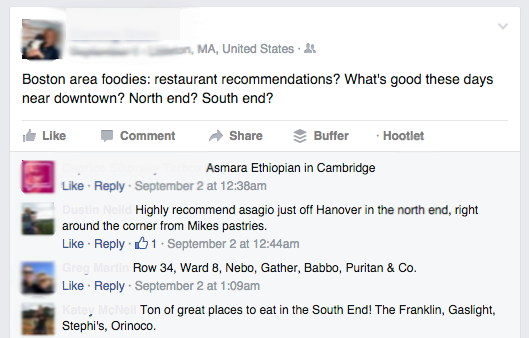By Steve Rayson

Facebook Is Driving Web Traffic
Traffic analytics firm Parse.ly recently published data that shows more traffic to news and media sites is now driven by Facebook than Google, see the chart below. It appears that people are finding content in their Facebook feed and clicking through to articles directly from their feeds.
Parse.ly’s base of clients include over 400 major news and media outlets, including Wired, The Atlantic, Reuters, Mashable, The Next Web and Business Insider. The sites they monitor receive over 6 billion pageviews and over one billion unique visitors per month.
Google might take some comfort from the fact Parse.ly’s sites are primarily news and media sites. However, Shareaholic report similar trends across a wider range of sites as reported in the New York Times and shown below.

The latest Shareaholic report shows that social has continued to rise and is now the main source of traffic overtaking search. The biggest driver of social traffic, driving over 90% of such traffic, is Facebook.
These findings have significant implications for the way people discover content and how content gets amplified. For example, many companies spend a lot of time on their website home page design and navigation but with the growth of social network referrals how many people ever see a home page? Many users are going direct to articles that have been shared and then going back to their social feeds. Many will never see a website home page. It appears that social feeds are now a core part of content amplification. This could be paid such as ads in social feeds or creating engaging content that is shared by people in their own feeds. Successful publishers such as PlayBuzz and Buzzfeed have become the masters of creating shareable content, getting their content shared tens and hundreds of thousands of times in social feeds.
Why Has Facebook Grown as a Content Discovery Layer?
The chart below from Shareaholic shows how Facebook has grown grown significantly as a content discovery layer and referrer of traffic. Many other social networks, including Twitter, appear to have flatlined in comparison.
I believe the reason for this is the success of the Facebook news feed. None of us can read all the content being published, not even just the headlines. Facebook’s aim was to create a news feed full of relevant content for their users.
“If you could rate everything that happened on Earth today that was published anywhere by any of your friends, any of your family, any news source, and then pick the 10 that were the most meaningful to know today, that would be a really cool service for us to build. That is really what we aspire to have News Feed become.” – Chris Cox, Facebook’s chief product officer (to Time Magazine in July 2015)Thus what Facebook have been building and refining is a relevant, personalised news feed. Recent refinements include adjusting the feed for how long you spend reading particular stories.
It appears that Facebook have been very successful in creating an engaging newsfeed. A feed where users will spend a significant amount of time. According to Forrester, Facebook owns 13% of all time spent on mobile devices and the average U.S. Facebook user spends 14 hours a month in their mobile Facebook feed.
The average U.S. Facebook user spends 14 hours a month in their mobile Facebook feed.Facebook recently published an interesting Facebook Insights Research Report. The research that stood out for me was the data on how people use Facebook as a content discovery layer. Their findings are summarised in the chart below.

We would probably expect people to use the feed to discover information about their friends and related content but almost half of the people surveyed also saw facebook as a place to discover new content. A further two thirds of those surveyed said they discovered new music, new TV shows and new movies through Facebook.
Two thirds of people discover new music, new TV shows and new movies through FacebookFacebook is not the best channel for all content discovery. If you want to know the age of an actor, the date of an event, the details of a theory, or the address of a restaurant then Google remains king. There are also many specific search and discovery apps and tools you can use, for exampmple, if you want to find accommodation, a restaurant or a house to buy. However, even here the power of the network is growing. People are asking their network for recommendations.

Want Content Discovered? You Need To Be In The Facebook News Feed
Many business to business people have said to me that Facebook is not relevant to them. That Facebook is a place for family stuff and really not very useful for many businesses.I personally think companies without an active Facebook strategy are potentially missing out. Can any of us ignore a channel that drives 25% of all web traffic? A channel that has more user attention than any other app on mobile devices?
It is true that it is a place for family and friends. However, if I am a lawyer its possible that my friends are also lawyers. Thus if I share a relevant article about my industry it is likely my friends may also read it and share it.
Facebook is changing, more news and industry content is appearing in my feed. Facebook is also pushing new products for businesses and journalists. It is a brave company that is betting against the Facebook news feed at this time.
if you are interested in getting driving more engagement in the Facebook news feed you might want to explore some of our recent articles:
- How to drive engagement in the world’s most powerful content channel
- Facebook interactions: Why shares, likes and comments all count
